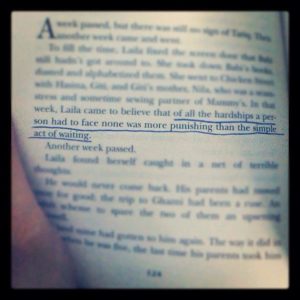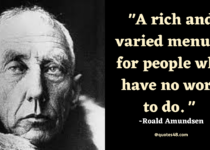a thousand splendid suns quotes
A thousand splendid suns is a great novel that revolves around familial relationship in the middle East. Written by Khalen Hosseini and published in 2007, it is considered an emotional, heartfelt story that tries to give strength and inspiration to readers. Here’s the best a thousand splendid suns quotes:
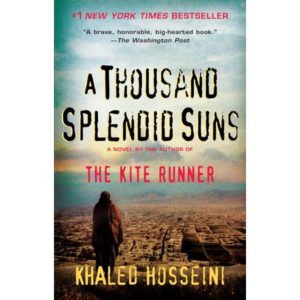
Mammy didn’t understand. She didn’t understand that if she looked into a mirror, she would find the one unfailing conviction of [Babi’s] life looking right back at her. (2.21.59)
“Do you have it in you?” Laila said.
“To what?”
“To use this thing. To kill with it.”
[…]
“For you,” he said. “I’d kill with it for you, Laila.” (2.25.19-22)
She would not miss him as she did now, when the ache of his absence was her unremitting companion—like the phantom pain of an amputee. (2.26.11)
As soon as she was in Mariam’s arms, Aziza’s thumb shot into her mouth and she buried her face in Mariam’s neck. […] Mariam had never before been wanted like this. Love had never been declared to her so guilelessly, so unreserved. (3.35.5-6)
The past held only this wisdom: that love was a damaging mistake, and its accomplice, hope, a treacherous illusion. And whenever those twin poisonous flowers began to sprout in the parched land of that field, Mariam uprooted them. (3.35.26)
Somehow, over these last months, Laila and Aziza—a harami [illegitimate child] like herself, as it turned out—had become extensions of her and now, without them, the life Mariam had tolerated for so long suddenly seemed intolerable. (3.35.27)
Laila crawled to her and again put her head on Mariam’s lap. She remembered all the afternoons they’d spent together, braiding each other’s hair, Mariam listening patiently to her random thought and ordinary stories with an air of gratitude, with the expression of a person to whom a unique and coveted privilege had been extended. (3.46.71)
[Mariam] thought of her entry into this world, the harami child of a lowly villager […] A weed. And yet she was leaving the world as a woman who had loved and been loved back. (3.47.62)
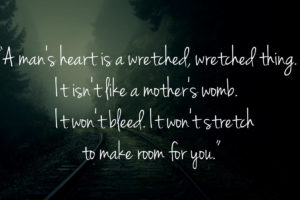
Most times, Laila and Tariq make love in silence, with controlled muted passion […] But for Laila, being with Tariq is worth weathering these apprehensions. When they make love, Laila feels anchored, she feels sheltered. (4.49.26)
Mariam is never very far […] mostly, Mariam is in Laila’s own heart, where she shines with the bursting radiance of a thousand suns. (4.51.37)
She pictured herself in a classroom with other girls her age. Mariam longed to place a ruler on a page and draw important-looking lines. (1.3.26)
She pictured herself in a classroom with other girls her age. Mariam longed to place a ruler on a page and draw important-looking lines. (1.3.26)
“[T]he husband fancies himself some kind of educated intellectual. But he’s a mouse. Look at him. Doesn’t he look like a mouse?” (1.12.13)
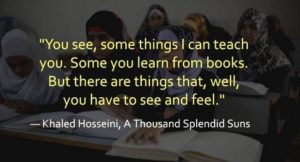
A society has no chance at success if its women are uneducated, Laila. No chance. (2.16.56)
For the last two years, Laila had received the awal numra certificate, given yearly to the top-ranked student in each grade. She said nothing of these things to Hasina, though, whose own father was an ill-tempered taxi driver who in two or three years would almost certainly give her away. (2.16.57)
In fact, Babi thought that the one thing the communists had done right […] was in the field of education […] Almost two-thirds of the students at Kabul University were women now, Babi said. (2.18.103)
There, men saw it as an insult to their centuries-old tradition, Babi said, to be told by the government—and a godless one at that—that their daughters had to leave home, attend school, and work alongside men. (2.18.108)
Aziza said Kaka Zaman made it a point to teach them something every day […]
“But we have to pull the curtains,” Aziza said, “so the Taliban don’t see us.” (3.42.75-76)
Learn this now and learn this well, my daughter: Like a compass needle that points north, a man’s accusing finger always finds a woman. (1.1.26)
A man’s heart is a wretched, wretched thing, Mariam. It isn’t like a mother’s womb. It won’t bleed, it won’t stretch to make room for you. (1.5.25)
The women in this part of Kabul were a different breed from the women in the poorer neighborhoods—like the one where she and Rasheed lived, where so many of the women covered fully. (1.11.19)
She remembered Nana saying once that each snowflake was a sigh heaved by an aggrieved woman somewhere in the world […] As a reminder of how women like us suffer, she’d said. How quietly we endure all that falls upon us. (1.13.37)
Marriage can wait, education cannot. You can be anything you want, Laila. I also know that when this war is over, Afghanistan is going to need you as much as its men, maybe even more. (2.16.56)
Mariam heard the answer in his laugh: that in the eyes of the Taliban, being a communist and the leader of the dreaded KHAD made Najibullah only slightly more contemptible than a woman. (3.37.58)
Mariam saw now the sacrifices a mother made. Decency was but one. (3.39.25)
In Laila’s dream, she and Mariam are out behind the toolshed digging again. But, this time, it’s Aziza they’re lowering into the ground. (3.40.63)
Had she ever been a deceitful wife? she asked herself. A complacent wife? A dishonorable woman? Discreditable? Vulgar? What harmful thing had she willfully done to this man to warrant his malice, his continual assaults, the relish with which he tormented her? (3.45.22)
